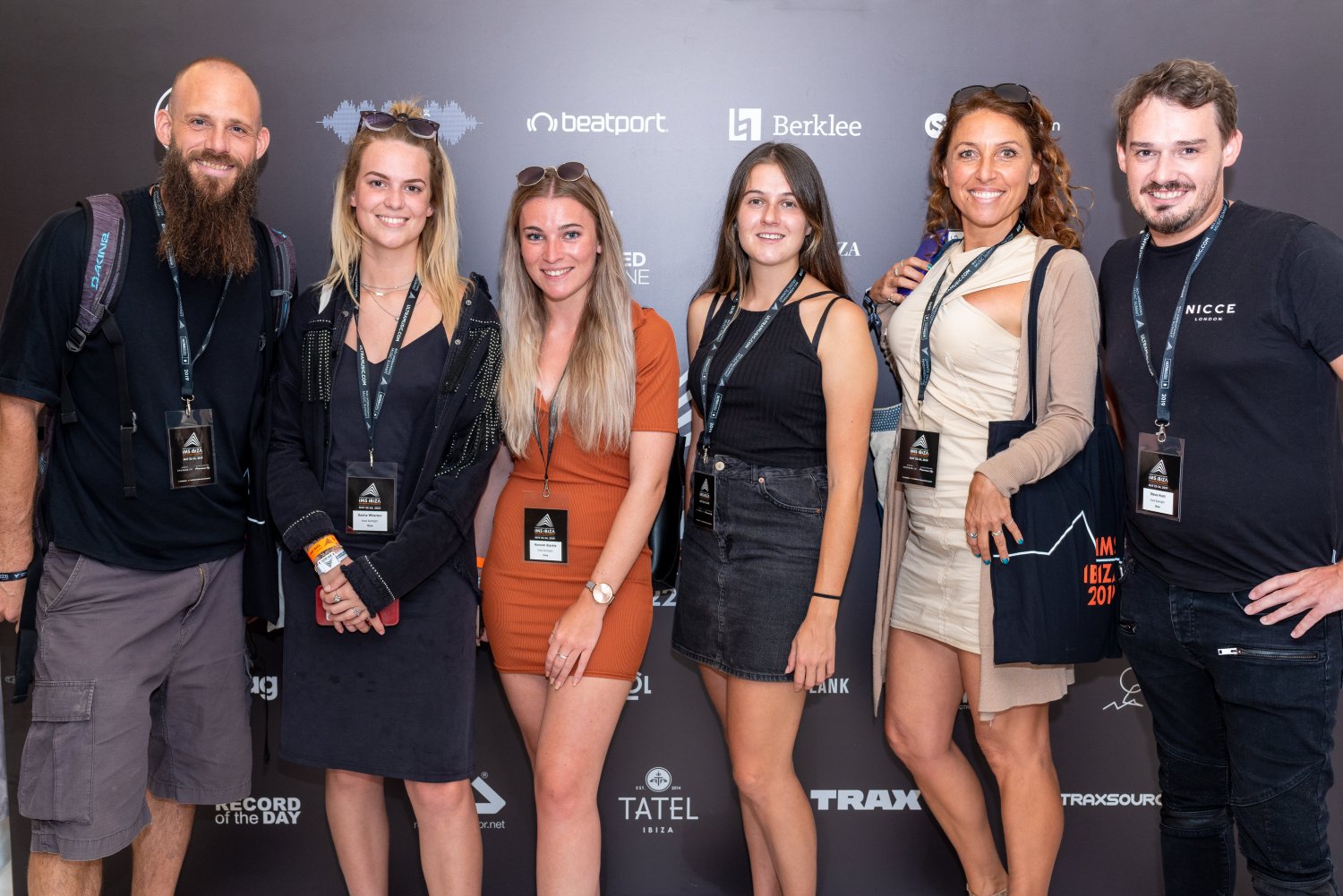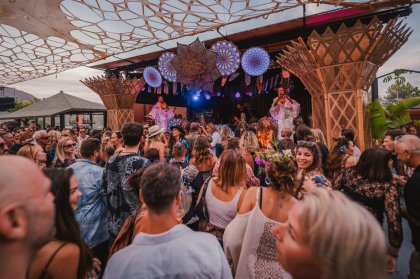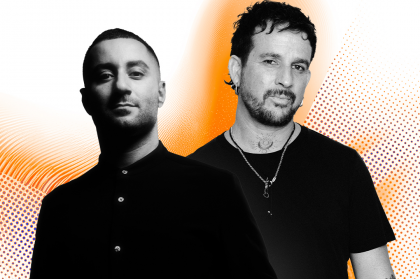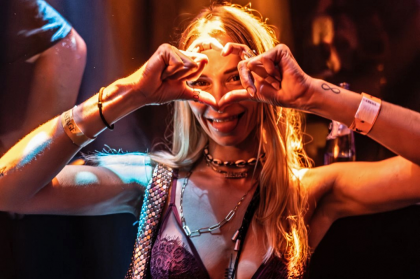The Ibiza Spotlight clubbing team ready for day one of IMS.
Modern life moves at lightning pace - the electronic music industry, even more so. Whether it is sound and lighting systems in the clubs, ticketing systems or the ways artists deliver music to their fans, every interface is being streamlined and made more efficient. Bigger. Better. Slicker.
The recurring theme flowing through day one of the International Music Summit (IMS) seemed to be the ever-changing landscape of our business - where we are right now and where we are headed. IMS itself is no stranger to change.
When it began 12 years ago, only 90 people attended the conference. The first after-party was held on the tennis court at Pikes with 150 people turning up.
Compare that to today, where 2,000 attendees experience the summit before an extra 1,000 join the party for Dalt Vila's grand finale.
Staying true to its “international” status, Day One was a global affair, inviting representatives from around the world. Figures from London, Berlin, Brooklyn, Montreal and elsewhere all added their thoughts on the state of play.
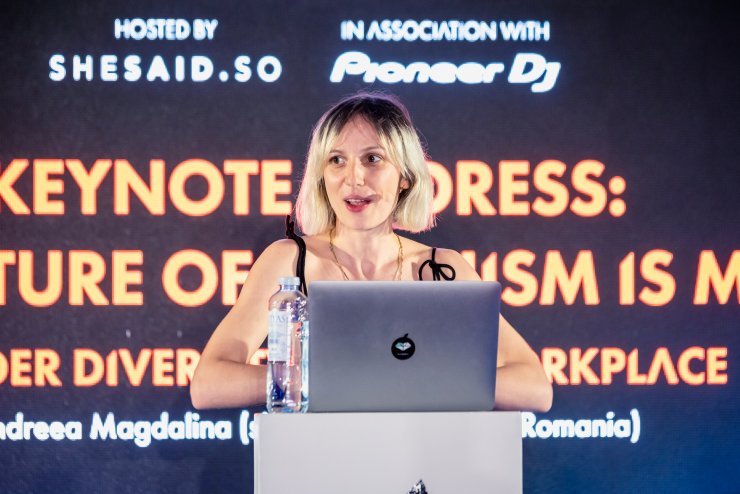
The current climate
shesaid.so co-founder Andreea Magdalina - besides being heavily involved in the curation of this year's IMS - opened proceedings. She delivered an impassioned keynote address about the ongoing discussion of gender diversity to set the day's tone.
Although this debate isn't going anywhere soon, thankfully, there were some positives to report. When Andreea started shesaid.so, she regularly found herself stonewalled. Five years down the line, “our collective efforts have meant that the topic can no longer be ignored.”
Turning the discussion on its head, Andreea placed the onus on men - specifically decision-makers in the boardroom - to be the agents of change. Going down a different route to the common rhetoric, she instead chose to pander to a language they understand: economics.

Research conducted by the International Monetary Fund linked companies' diversity with improved financial results. Appealing to those with eyes on the margins, Andreea asked “if you don't have a sister or a daughter to do it for, do it for your wallet,” calling for men to “embrace these findings.”
Her claims were only further supported later in the morning when Kevin Watson dissected the finances of the sector. Artists like Nina Kraviz, Amelie Lens and Charlotte de Witte showed the most growth, proving that women in music are a force to be reckoned with.
However, Andreea was quick to point out that women were not “planning world domination”, but merely seeking “restoration of balance.” By working as allies, “everybody wins.” The discussion continues on Friday with further input from more industry professionals.
Head here for the full report.

Where are we headed?
Fast-forward to the tail end of the day, and another keynote speaker Keith Reilly of fabric also had a lot to get off his chest. Making a rallying call for all corners of the industry to unite, he spoke in depth about what he considered to be a “crisis in clubland.”
Nobody was safe from criticism, least of all the authorities. But instead of being divisive, Keith called for greater understanding, cooperation and collaboration between all stakeholders. From the consumer to the agents - and everybody in between - he requested we find workable solutions for the good of the industry.
Here was a request to curb egos and sacrifice personal gain for the greater collective good: “Self-interest on both sides, just makes us all short-sighted.”

Contradictory to what has been suggested in earlier panels about the use - and often the manipulation - of data, Keith made no secret of his disdain for algorithms and the double-edged sword of social media.
Pragmatically, it was left to one of the younger generations to offer some balance to Keith's wary outlook. It's not all doom and gloom in the current climate, as 24-year old Jaguar of Mixmag articulated, “I'm really proud of my generation; there are so many amazing alternative nights" (to the big clubs).
“We have built something that stands for something - politically. Our generation isn't just throwing club nights for the sake of it.” Clubland has undoubtedly changed, but so, too, has the whole world.
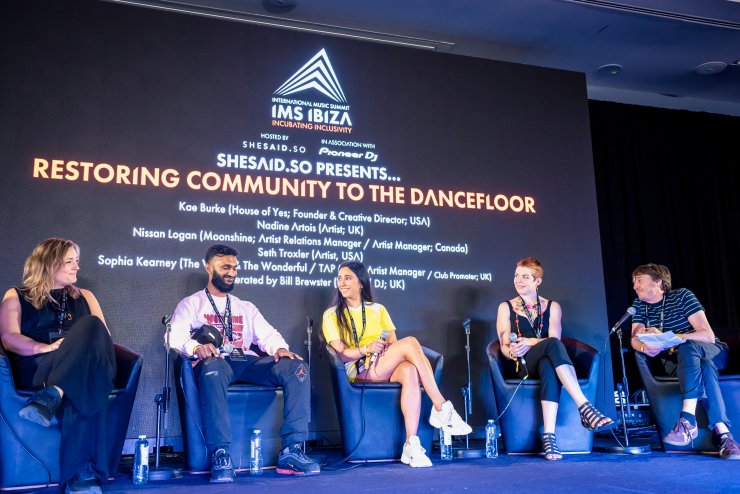
Back to our roots
Could electronic music be guilty of losing sight of its original ideals and values? As the old saying goes, if you don't know where you've come from, you don't know where you're going. The panel on Restoring community to the dance floor highlighted how far the scene has strayed from those origins.
Club culture was born in the marginalised black, Hispanic and LGBTI+ communities of the US. Yet today dance floors are predominantly white, male, straight and middle-class. The inclusivity that was once so fundamental has vanished.
Even down to bottle service and VIP culture - extreme forms of exclusivity alienate the less privileged. Worse still is the accusation that a lot of the intolerance and discrimination from society has filtered down to clubs and festivals.
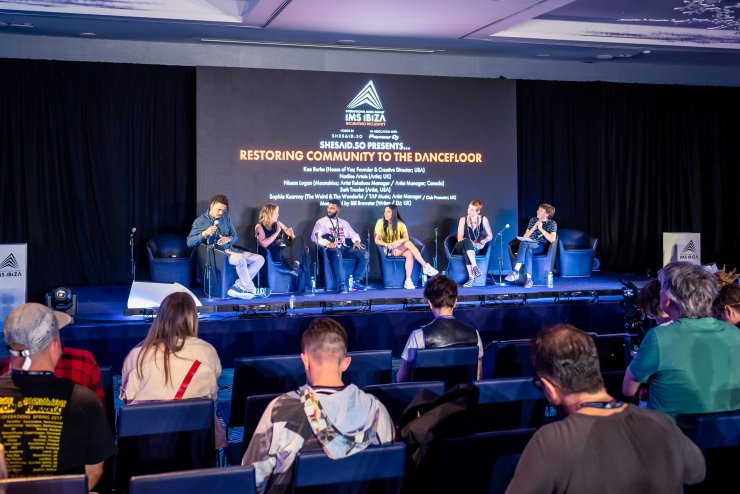
Panel chair Bill Brewster was quick to point to the symbolic names of iconic venues: the Sanctuary, Paradise, Garage - these were “places to get away from the problems of the outside world.”
Fortunately, we do appear to be in the midst of a counter-movement, that is placing particular emphasis on making things more inclusive again.
Sophia Kearney, one of the minds behind London-based party HE.SHE.THEY. spoke about how the environment was right to launch the concept in early 2018.
“Everybody was ready for it to happen,” citing parties who share a similar ethos who emerged around the same time. Sounding off with plea of “lead by example.” The message was clear: be the change that you want to see in the world.

Fellow panellist Kae Burke of House Of Yes agreed, urging recruiters to give jobs to those who have less opportunities. “Nurture and train them to be a manager or the marketing director.” It pushed home the idea that this is far more than merely an issue at surface level.
“It's not enough just to put a black, trans person on a line-up. How does that person move around the club?”
Whilst it is great that we are seeing initiatives such as club buddies and dedicated taxi services for trans women, it's also a sad indictment that such systems are necessary in the first place. It is little wonder that minorities have disappeared from our clubs.

CONCLUDING
Electronic music by its very nature is forward-thinking, boundary-pushing and willing to adopt the latest technology. Whilst the industry is still facing issues - gender inequality, disillusioned communities and an uncertain future - it is, at the very least, showing a desire to tackle these challenges.
These challenges also affect the wider society. Regardless of the hard truths presented today, we can take some solace in being a beacon of hope for other, less liberal industries.
There is still much work to do, but our industry seems more primed and more proactive in tackling them head-on, in comparison to others. Echoing Seth Troxler's words on the Restoring community to the dance floor panel: “We are the most progressive culture in the world.”
We are quick to adopt the latest fashion trend, breakthrough artist or new sub-genre, perhaps we need to be quicker to adopt a change in mentality? Maybe even an old school mentality? The future is unknown, but we do not go in blind.
Now, more than ever before, we are able to meticulous plan ahead with access to mountains of analytical data. Let's make sure we use these tools as much for moral intentions, as we do for economic ones.
